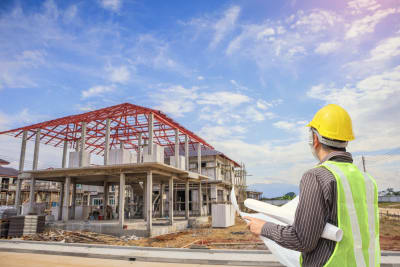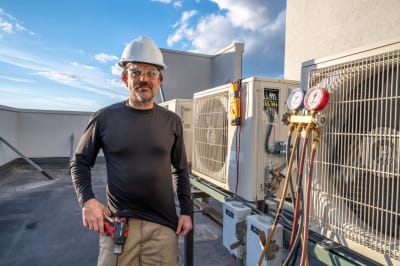Home and building inspectors possess a wealth of knowledge and expertise regarding the essential aspects that make a home or building great. Through significant training, these professionals are familiar with specific factors, materials, and systems to look for in a house to gauge its safety and quality.
Home and building inspectors in North Carolina are well rewarded for their efforts with opportunities to scale their earnings even higher.
If you want to pursue a career in this field, the article below highlights everything you need to know to begin on the best possible footing. You’ll discover crucial steps, requirements, training destinations, and salary ranges here.
How to Become a Home and Building Inspector in North Carolina
Below is a step-by-step guide on how to become a home and building inspector in North Carolina.
Step 1: Finish an Approved Program
North Carolina — through the North Carolina Home Inspection Licensure Act enacted in 1993 — mandates all aspiring home and building inspectors to complete no less than 120 hours of home inspection training before they can practice legally in the state.
It is also imperative that this training come from an inspection course approved by the state. Apart from being a key licensure requirement, passing through a top-quality training program is also important to secure employment and network with other professionals in the field.
Step 2: Field Experience Training
Along with the fundamental training obtained from a home inspection course, candidates are also expected to conduct up to 80 hours of training in the field with at least 10 site visits. Doing so ensures that candidates would have received enough experience in the real world to make their transition into professional home and building inspectors a lot easier.
Step 3: Pass the Licensing Exam
In North Carolina, home and building inspector college graduates are expected to apply for and pass a state exam before obtaining their license. Known as the North Carolina State Home Inspection Exam, the exam incurs a $80 application fee. The North Carolina Department of Insurance, based in Raleigh, administers it annually.
Step 4: Secure Employment
After completing the above steps, candidates may secure employment in a multi-inspector home inspection firm or start their sole proprietorship or LLC.
Consider trades with similar paths:
Licensure & Certification Requirements
To become licensed by the state as full-fledged home and building inspectors, candidates in North Carolina must pass the North Carolina State Home Inspection Exam.
They must also go through a background check by any of the North Carolina State Bureau of Investigation, United States Federal Bureau of Investigation, criminalrecordcheck.com, or castlebranch.com.
Applicants are also expected to provide proof of insurance. This must include a general liability policy covering a minimum of $250,000 and any one of the following:
- Owned assets valued between $5,000 and $10,000,
- Surety bond ranging from $5,000 to $10,000,
- Errors and omissions insurance policy of at least $250,000.
Top Home and Building Inspector Schools in North Carolina
Here are some of the most popular training programs for future home and building inspectors in North Carolina.
Charlotte School of Professional Studies
Charlotte School of Professional Studies offers a quality home and building inspection training module designed to prepare students for the technical demands of the job, upcoming examinations, and the business aspects of the profession.
Casa Home Inspector Training
Casa Home Inspector Training is another wonderful destination for training as a future home and building inspector in North Carolina. The institute partners with the International Association of Certified Home Inspectors, giving candidates straightforward paths to certification.
Notable Mentions
Other notable mentions include the home inspection programs offered by the following institutions:
- America’s Choice Inspections (ACI),
- Inspection Certification Associates (ICA), and
- The Home Inspection Training Center
All of these institutions offer approved training with a comprehensive curriculum.
Explore home and building inspector schools by city:
Salary & Career Outlook
Home and building inspectors earn an annual salary of $55,683 in North Carolina. Those among the highest paid in this state earn around $97,896 yearly, while those among the lowest paid still manage an annual average salary of $31,673.
Concerning the best places to be a home and building inspector in North Carolina, they include Charlotte, with an annual average salary of $63,107; Raleigh, with an annual average salary of $58,406; and Durham, with an annual average salary of $58,406.
Location is one of many factors determining how much a home and building inspector in North Carolina will earn. Other notable determinants include the experience level, the specific company or firm where a home and building inspector works in the state, and business structure.





